Interview with Timothy Leary archivist Michael Horowitz
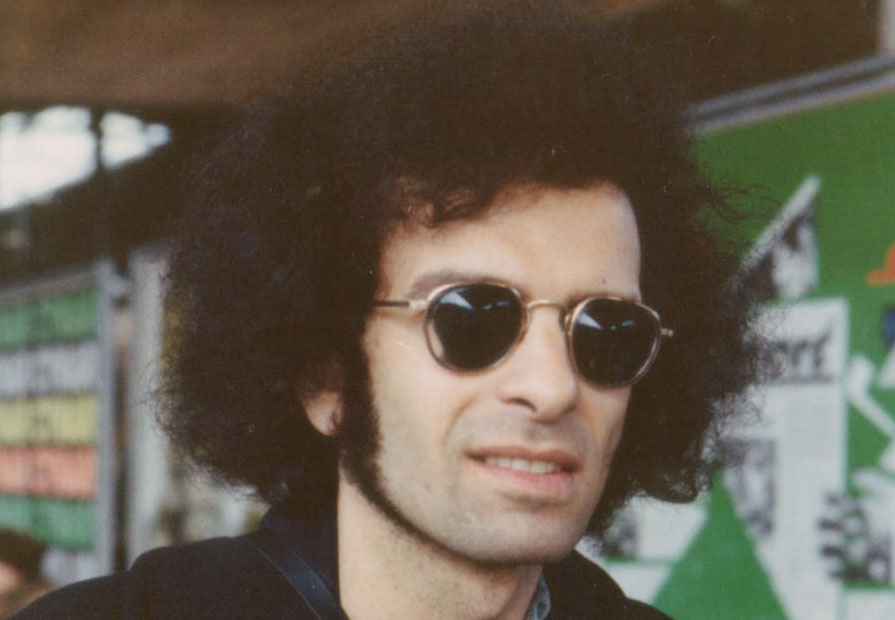
This is Part 3 of a series. Part 1. Part 2.
Switzerland - Afghanistan - California, August 1971 - April 1973
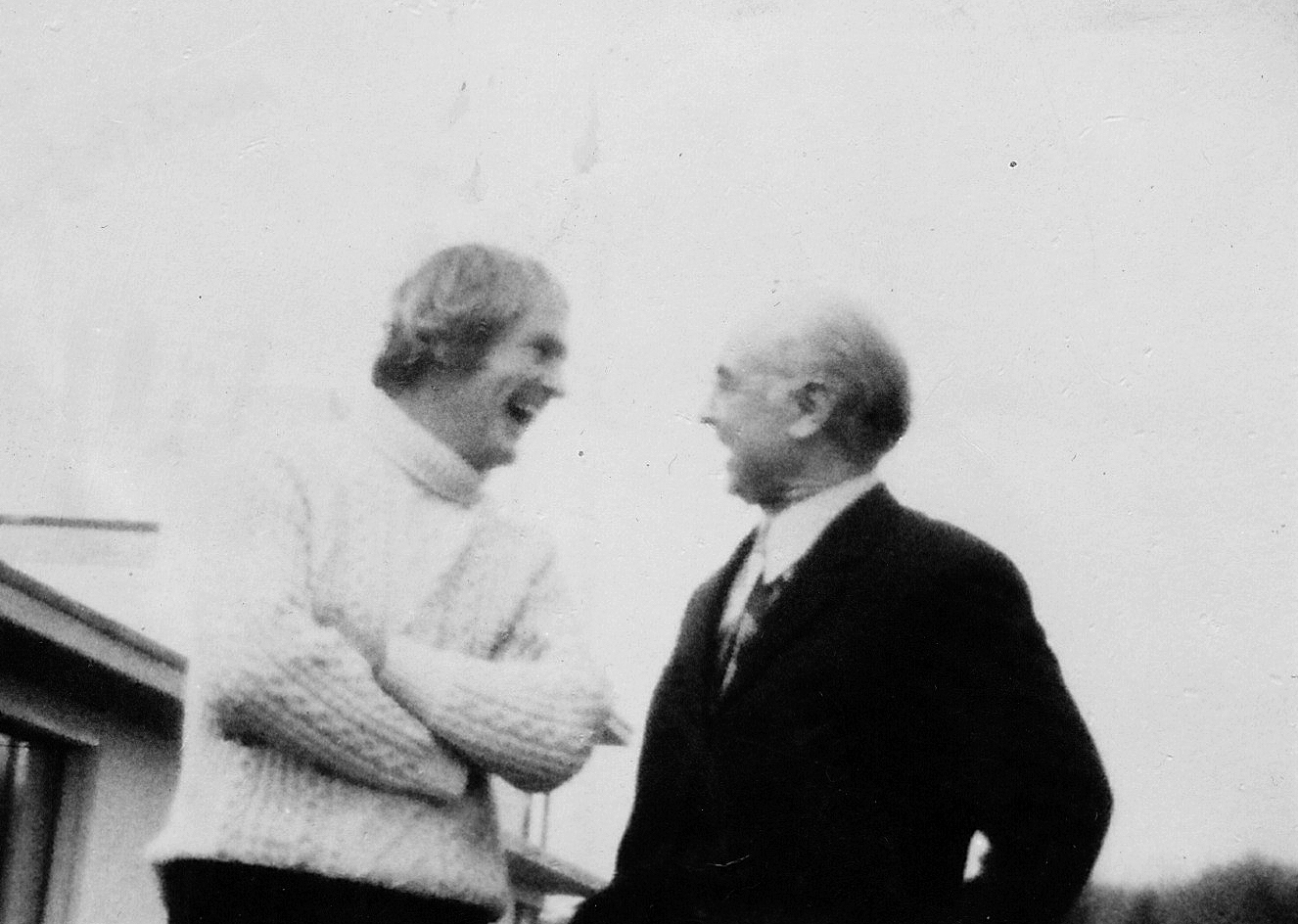 1. Dr. Leary and Dr. Hofmann on the grounds of Hofmann's estate in Burg-i-L, Switzerland. Feb. 1972. Photo: Michael Horowitz. Leary Archives, New York Public Library
1. Dr. Leary and Dr. Hofmann on the grounds of Hofmann's estate in Burg-i-L, Switzerland. Feb. 1972. Photo: Michael Horowitz. Leary Archives, New York Public Library
"The last two weeks have been the first time in two years that we've been able to watch the fire every night, and the stars, and establish our regular spiritual routine. It was a lurching, melodramatic voyage here, but we arrived at the space pre-destined, in the Alps, listening to the brook which leaps down the slope twenty green yards from our side door." - Timothy Leary writing from Villars, shortly after Switzerland denied the U.S. request for his extradition.
LR: OK, so Tim is freed from yet another jail in Switzerland -- his third in less than a year on three different continents. He was originally denied bail by a Reagan-appointed judge and then on the run from the prison escape -- and now the Swiss Government gave him a break?
MH: The US extradition reprieve was almost as stunning as the prison break. The earlier one was carried out by a militant faction of the youth underground. The next by freedom of speech literati. It was mind-blowing to watch Allen Ginsberg call on all his resources to deny Nixon his Leary trophy.
LR: Switzerland lived up to its reputation as a safe haven for political and cultural refugees.
MH: Well, it was a bold thing to deny extradition of a psychedelic drug advocate in the climate of Nixon's newly launched "War on Drugs," but they gave the Learys provisional asylum to see how things worked out. The banking capital of the world did not want to become an international outpost for acid heads.
LR: So there was an implicit warning, based on their drug history? Were they supposed to be on their good behavior again, like in Algeria?
MH: Yes. Swiss authorities would be keeping an eye on him. So, of course, would Interpol and the CIA.
LR: What were the exiles' lives like now?
MH: The Swiss counterculture rallied for Leary during his captivity in Lausanne. Tim joked there were 100 hippies in Switzerland and he'd met them all.
He enjoyed being the toast of a circle of psychedelic artists, writers and hashish smokers. So many illustrious exiles-- Hesse, Joyce, Voltaire- had found refuge there. Paracelsus and Albert Hofmann performed alchemical magic there. Herman Hesse's grandson, who'd visited Leary in jail and brought him an original painting by his grandfather, hung out with him. And he took up skiing.
LR: Well, that was sure more freedom than they were given in Algeria, right?
MH: It was better for sure. A hip Jungian therapist and his wife put up Tim and Rosemary at their home in Immensee, where the legend of William Tell originated. The Learys felt truly free for the first time since Tim went to prison.
LR: How long did that go on?
MH: Not very. There were setbacks. Rosemary's operation to help them conceive a child-a longtime dream of theirs-didn't turn out the way they'd hoped. Living in relative safety and comfort exposed the stresses of exile and cast a pall over their seven-year relationship.
Another bummer was Tim being forced to assign all his future earnings to the shady French businessman in the arms trade he called Goldfinger (Michel Hauchard), who had financed their stay in Switzerland and had hooked him up with the top lawyer there. The guy smelled a big payoff when and if Tim sold the rights to his prison escape book, which he'd been struggling to finish while living on the run. Some months later it was big news in the publishing world when Leary signed a contact with Bantam for an advance of $250,000.
LR: Wow!
MH: His story was that hot-the mind-blowing prison escape, the publicized conflict with the Black Panthers in Algeria, his Swiss jailing and international extradition battle with Nixon. The big time literary agents and international lawyers who came to Bern to broker the deal got a large chunk, but it was Hauchard who took the lion's share of the advance and even forced Tim to sign away rights to his future books. When Tim told him we had the latest draft back in San Francisco, he flew out and tracked us down--but that was after we returned with it from our visit.
LR: Oh no. Are you saying that Tim didn't get any of it?
MH: He bought a Porsche with his ten grand. That was it.
LR: Did Tim ever get back the rights to his own story?
MH: Yes, he did eventually get back the rights to his books. What really floored us was to learn that Rosemary had moved out.
LR: What happened there?
MH: It happened on his birthday, a couple of months before our visit. She asked us to place an announcement in the Berkeley Barb that she was no longer responsible for her husband's affairs. She wrote us to send their marriage certificate and other personal papers.
LR: Yes, well, I've heard she had her reasons...
MH: She deeply loved Tim but was burnt out from the years of drama--their arrests, court battles, imprisonments and living on the run. Not being able to conceive the child they wanted that would perhaps have settled their lives.
It was a bummer for those of us who knew them. They were one of the golden couples of the '60s. Rock stars. Psychedelic royalty. Rosemary's glamour, intelligence and wit perfectly complimented Timothy's personality. She was an indispensable partner in his creative endeavors and risked her freedom to help engineer his escape at a time when she wanted to have children and live under the radar of the media attention that Tim always courted to get his message out. Bob and I were sad to see her out of the picture, while also appreciating her need to escape the unrelenting drama of their fugitive life. Eventually, we would have to make similar choices.
LR: Did you know where she was headed?
MH: A younger suitor from the Brotherhood days showed up and she left with him. They were well suited to each other. They traveled widely, staying incognito. She didn't contact us. Sicily, Afghanistan and Colombia were among their temporary locales. Eventually they split and she landed in Cape Cod managing a b&b there and later in Half Moon Bay under a variation of her maiden name. She didn't surface until the early '90s.
LR: She was a fugitive for that long? From the 1970s to the 1990s?
MH: Yes. She was one of the last imprisoned activists from the era to surface.
LR: Did she actually turn herself in? How did that come about?
MH: Tim initiated a court hearing for her to surface as Rosemary Woodruff. The judge threw out her 23-year parole violation, deciding that she was "led astray by Dr. Leary"--his words.
"Weren't we all?" we joked when Rosemary told us.
LR: How did the breakup affect Tim?
MH: He took it hard at first, but he rebounded quickly and very soon began a relationship with a young California woman passing through the village.
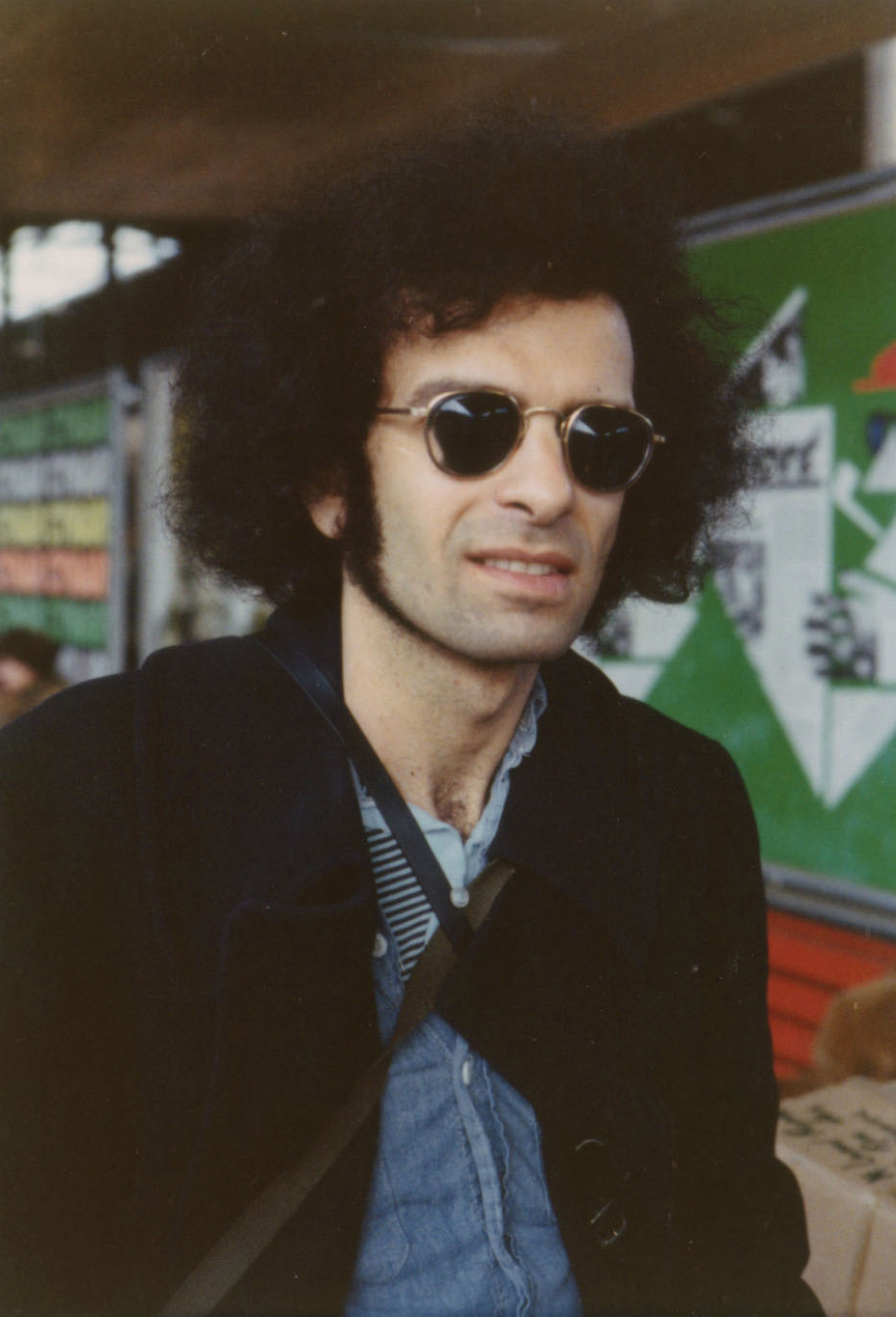 2. Michael Horowitz at Lucerne train station, Feb. 1972. Photo: Timothy Leary. Leary Archives, New York Public Library
2. Michael Horowitz at Lucerne train station, Feb. 1972. Photo: Timothy Leary. Leary Archives, New York Public Library
LR: Is that when you and Bob showed up?
MH: Yes, in the middle of winter. We were coming from Paris, where we'd pilgrimaged to the building where the Hashish Club held their drug soirees in the 1840s.
LR: Is that the famous spot where French poets and artists hired chefs, musicians and courtesans and hung out for days eating hashish pastries?
MH: Leary credited them with creating the style of modern recreational use by taking hashish for sensual enhancement. Raps about drug history were some of our best conversations with Tim.
Another visit was to the Museum of Natural History to pay our respects to one of our heroes, the French mycologist Roger Heim, who first brought the magic mushrooms from Mexico to Sandoz Laboratories where Hofmann synthesized psilocybin, the psychedelic drug that Leary, Alpert and Metzner used in their experiments at Harvard a few years later.
LR: The magic mushroom pills that put this whole story in motion?
MH: Exactly. Heim showed us some from the original batch Albert Hofmann had synthesized for him and Wasson to bring to Maria Sabina for her to compare them to the mushrooms. They were small, round, pinkish tablets, just as Tim described them in his books.
LR: The Holy Grail of Psychedelics?
MH: To us it was. Hofmann had synthesized teonanacatl-God's flesh-into pills. A follow-up to discovering LSD.
LR: And now it's the hot new medical research tool.
MH: Just when it's needed most.
LH: Let's get back to the meeting in the train station. What was it like seeing Tim for the first time since your California prison visits?
MH: There he was with that famous smile. We exchanged big hugs. As Barker and I walked with him through the station, Tim pointed to a kiosk which displayed the leading Swiss news magazine. His face was plastered on the cover under the headline PROPHET AUS DEM LAM [PROPHET ON THE LAM]. I asked him for a few Swiss francs to buy it.
LR: For the archives!
MH: Exactly what Tim said. We had stepped right into our role. We drove off in his funky VW bus--the iconic hippie vehicle-with a Black Panther sticker on the hood, no less, a very uncommon sight in Switzerland.
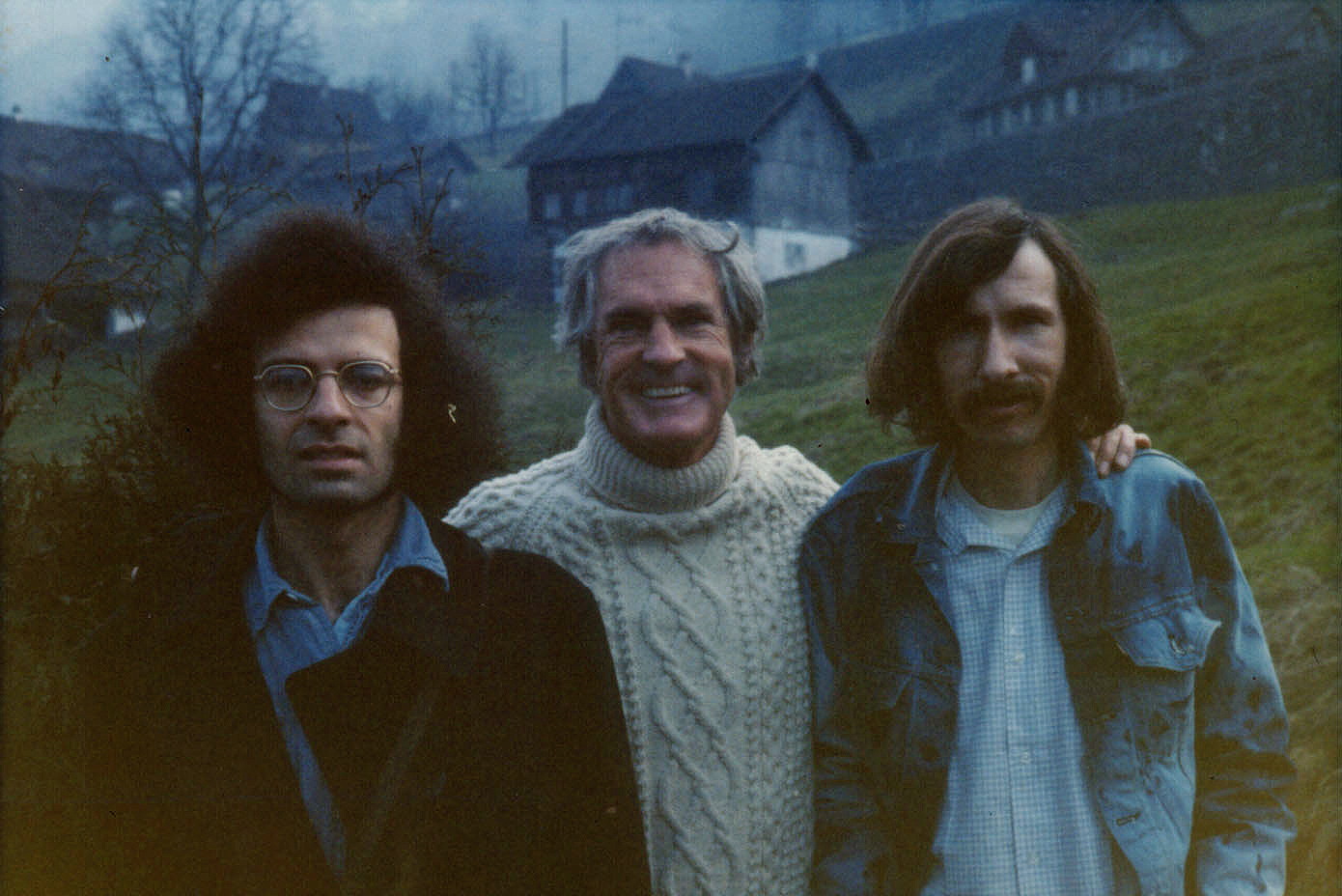 3. Timothy Leary with Michael Horowitz and Robert Barker. Immensee, Switzerland, Feb. 1972. Photo: Susan Leary. Leary Archives, New York Public library
3. Timothy Leary with Michael Horowitz and Robert Barker. Immensee, Switzerland, Feb. 1972. Photo: Susan Leary. Leary Archives, New York Public library
LR: What was the scene like in Immensee?
MH: We stayed in the chalet of Tim's hosts. His daughter Susan was visiting with her newborn daughter Dieadra--Tim's first grandchild. They are in the home movie we took during our visit.
LR: And Cindy had given birth to Winona. Is that when Tim became her godfather?
MH: I showed him a photo of her taken a few days after she was born and asked him. It just popped into my head.
LR: You three must have done a lot of catching up.
MH: Yes. A lot of talk about things that had gone down, about the people and the hassles, but the focus soon became the book which had turned into a real struggle for him to write.
LR: What was the problem?
MH: The fugitive lifestyle-living on the run. No money. No control. Learning that his house in the Berkeley Hills had been sold to pay his legal debts. Fear of being captured and returned to Nixon's America. The prospect of McGovern and the anti-war movement winning the next election and Tim getting pardoned was pretty dim.
All that slowed down the creative process. Brian Barritt, a brilliant and eccentric British writer showed up with his wife Liz and their son. He'd done four years in prison for hashish smuggling and written about it in Whisper. Brian had gotten Tim into Aleister Crowley in Algeria, and the alchemists John Dee and Edward Kelley in Switzerland. Barritt was probably Leary's closest literary collaborator before Robert Anton Wilson.
When we arrived the pressure was mounting and he looked to us to bring fresh energy to the project. Bob and I brought along an album of news clippings to illustrate and document the book.
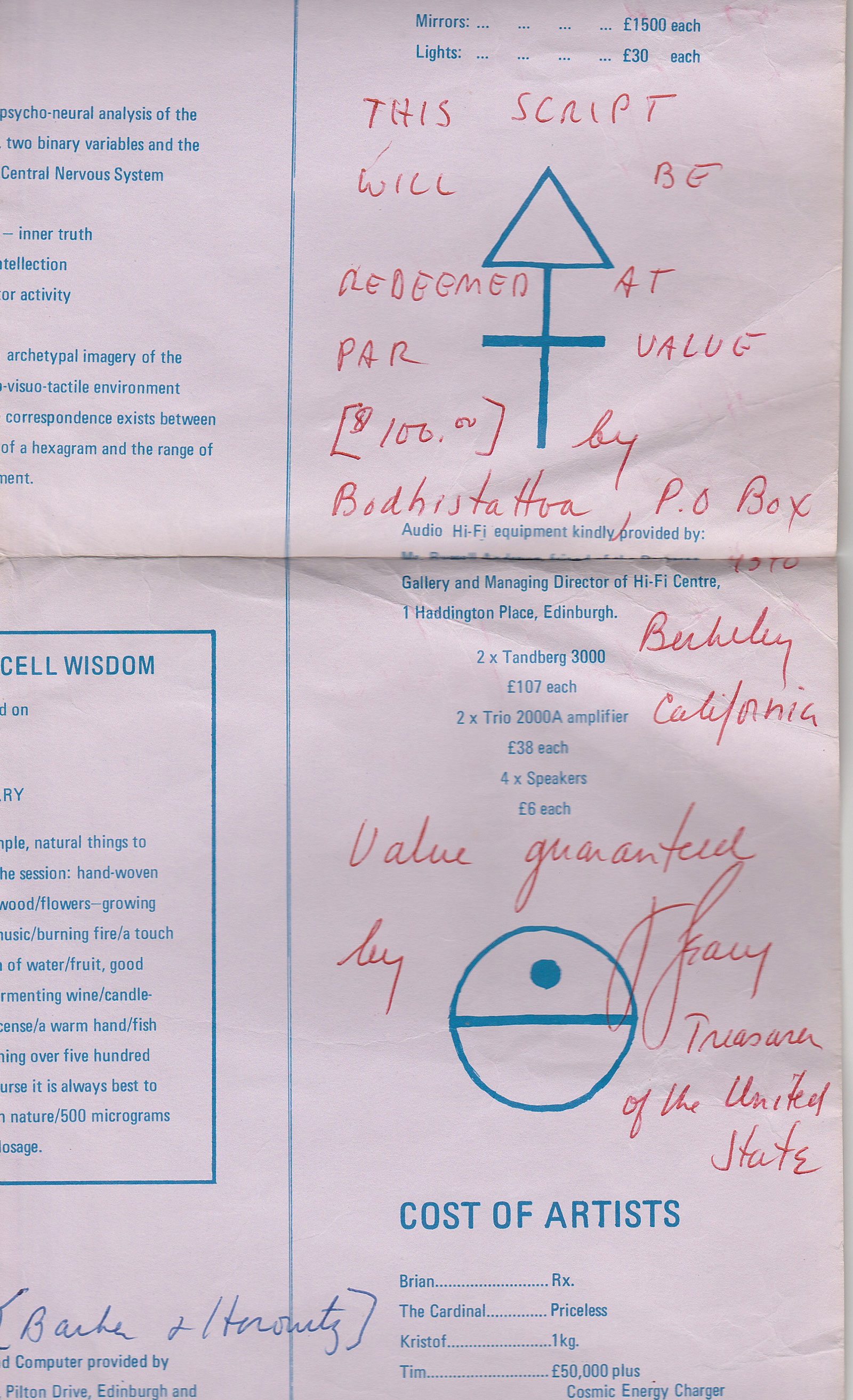 4. "Timothy Leary, Treasurer of the United State." Portion of a flyer for Changes '72 Exhibition, Edinburgh, annotated by Leary, "underground as usual." Feb. 1972. Michael Horowitz collection
4. "Timothy Leary, Treasurer of the United State." Portion of a flyer for Changes '72 Exhibition, Edinburgh, annotated by Leary, "underground as usual." Feb. 1972. Michael Horowitz collection
LR: Was this Confessions of a Hope Fiend?
MH: That was the book it became. Earlier rejected titles were It's About Time and Escapades. By this time, he was on about the eighth version of his draft. It would grow to 17. It was because of that series of drafts the FBI seized his archives from me three years later, in 1975.
LR: Wait a minute. Why was the FBI interested in Tim's archives? Did they think there was information in there that could help them determine who had helped Tim escape?
MH: Exactly. The government was obsessed with capturing those who aided, abetted and performed it. Tim had to protect them by being vague in his writing and leaving important things out. Changing names.
LR: So, who else had come to visit?
MH: William Burroughs had visited just before us. Tim saw himself as a Burroughsian anti-hero in a science fiction landscape, fleeing the Nova Mob after him for advocating enlightenment drugs. We were beginning to feel like that ourselves, being in his orbit those years.
LR: Like riding the Nova Express?
MH: That's how he wanted to do the book, as a space-time adventure, but the publishers insisted on a straightforward account, which was what the book eventually was. He got to tell the story again the way he wanted to in What Does WoMan Want?
LR: Tell me about going with Timothy to visit Albert Hofmann in Basel.
MH: Tim and I took the train to Basel, where Albert picked us up in his car. You can see this in the movie. Albert drove, Tim sat in the passenger seat, and I sat in back, trying to manage an 8mm movie camera with one hand and a tape recorder with the other. [We are preparing the footage to upload in a future post.]
Albert told us that we were driving the route of his first LSD trip in 1943, when he bicycled home with his lab assistant after testing it on himself in his Sandoz lab.
LR: Oh! I thought he was alone on that epic ride.
MH: She was Susi Ramstein who accompanied him to make sure he got home safely. She later became the first woman to take LSD.
LR: How amazing for you, as a historian and archivist, to be with Timothy Leary and Albert Hofmann as Hofmann tells the story of his LSD bicycle trip!
MH: I almost lost myself in the psychedelic ambience. I wanted time to slow down, to be on acid. Tim cracked up when I asked Albert if he still had the bicycle. I knew it was gauche of me, but --
LR: You're an archivist-you had to ask. Well, did he have the bicycle?
MH: Sadly, no. He really had no idea what became of it.
LR: Tell me more about the car ride.
MH: Well, for one thing, I sensed a little discomfort between Tim and Albert. But they got off talking about mutual friends--researchers and personalities they both knew, like the Huxleys and Gordon Wasson. I told them I'd visited Heim and seen the psilocybin pills from Albert's first synthesis. Tim recalled how thrilled he and Ram Dass (then, Richard Alpert) and Ralph Metzner were when the first package from Sandoz arrived at the Harvard psychology department. But things became a bit contentious between them when the subject turned to the psychedelic scene today.
LR: Ah, yes. What Albert called his "Problem Child."
MH: Right. Hofmann and Leary had different ideas about who should be using LSD, older mature people or the under-30s. You can imagine which sides they were on. Hofmann was fifteen years older, and more traditional. Timothy believed young people in the 1960s had been exposed to much more than the previous generation, especially electronic technology, and so were more suited. Most of Tim's academic-minded contemporaries probably agreed with Albert.
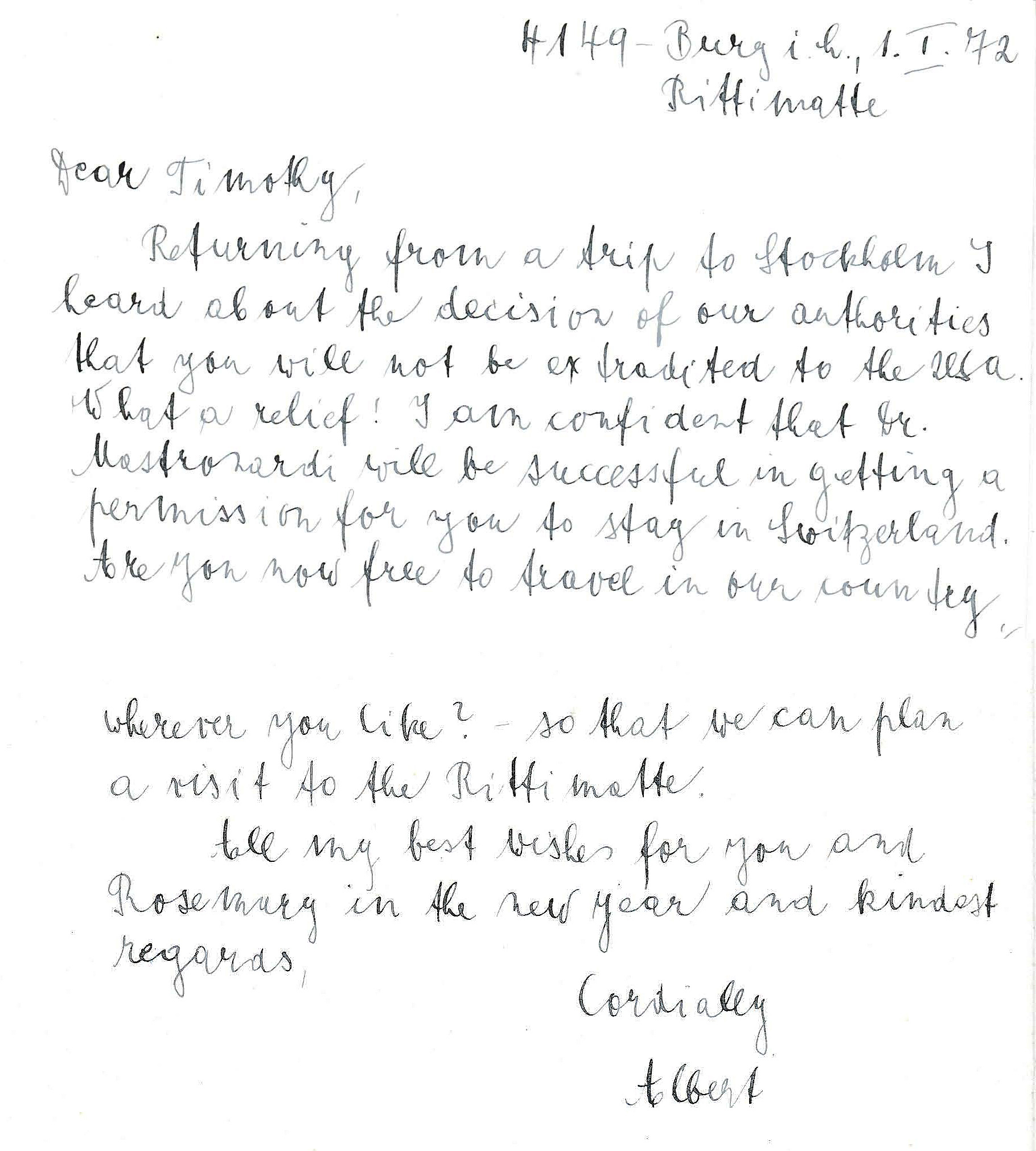 5. LSD discoverer Albert Hofmann congratulating Tim Leary on his successful legal battle and inviting him to visit. New Years Day, 1972). Leary Archives, New York Public Library
5. LSD discoverer Albert Hofmann congratulating Tim Leary on his successful legal battle and inviting him to visit. New Years Day, 1972). Leary Archives, New York Public Library
LR: How did the rest of the visit go?
MH: Awesome. Albert gave us a tour of the grounds which bordered France, then took us back to his house to show us his collection of mushroom stones and photographs from his Mexican expedition. A sheaf of ergot of rye preserved in Lucite. On a wall was a bas-relief of Demeter and Persephone from the Ancient Greek mystery rites that Tim likened to the '60s acid tests. Albert was meticulous, as one would expect a chemist to be. His lifelong mate Frau Hofmann served us tea and pastries.
Albert drove us back to the train station, stopping at the house where he was living when he discovered LSD in the middle of World War II. I captured a bit of their repartee on audio.
AH: That house is where we lived at the time. I never thought I would get home that day. My assistant who had ridden with me at my request asked permission to leave. I told her fine, but in fact I was in a panic. My wife and children were away. It was just me. I barely managed to crawl to my bed.
TL: It was the first bad trip, too. There was no precedent. You must have thought you'd poisoned yourself.
AH: But in the end it was good. In the morning it was fantastic.
TL: For me, the world changed forever. I would have remained a boring professional psychologist the rest of my life, making money and accomplishing nothing.
MH: Instead of being the most dangerous man in the world.
TL: Right.
MH: Someday there'll be a plaque over the front door, like there is on Paracelsus' house nearby. Albert asked for the movie camera to shoot Tim and me standing in front.
LR: Did you ever take LSD while you were in Switzerland?
MH: One day some of us dropped and took the mountain railway up the nearby ski mountain Rigi-Kuhn. It was mid-winter and we ascended into the snow. Bob and I hung out in the old lodge and soaked in the view and the vibes while Tim and our hosts skied.
LR: How long did you stay in Switzerland?
MH: About a week. We left with boxes of Tim's archives and a trunk with stuff we picked up for our drug library. We'd scored an 1890s Vin Mariani coca wine bottle in Paris. Sandoz memorabilia in Basel. First editions of European psychedelic writers and papers of scientists. A great haul for the library.
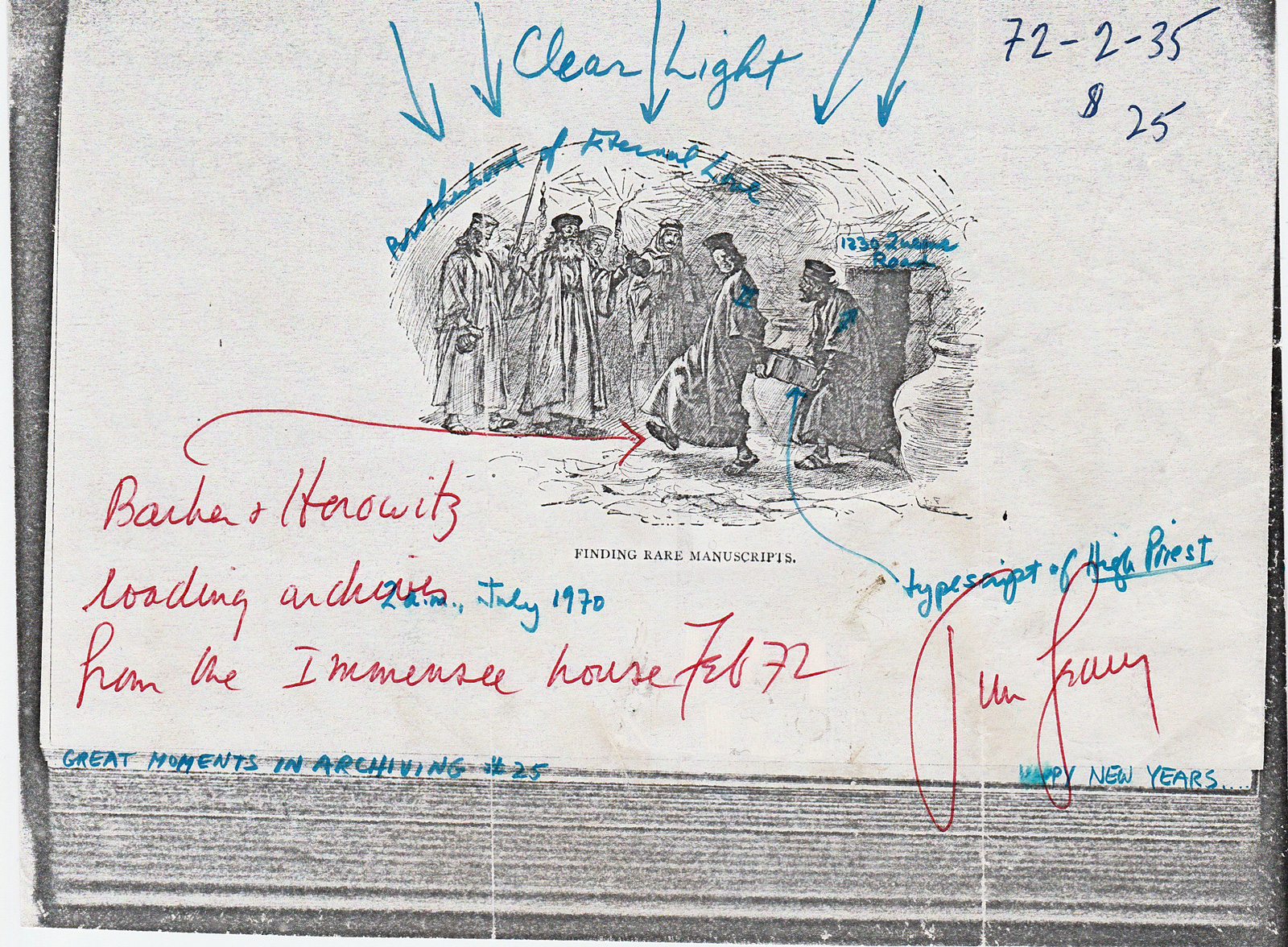 6. "Finding Rare Manuscripts," annotated mashup by Leary and his archivists on a 19th-century engraving. Leary Archives, New York Public Library
6. "Finding Rare Manuscripts," annotated mashup by Leary and his archivists on a 19th-century engraving. Leary Archives, New York Public Library
LR: How did you leave it with Tim?
MH: When we left, a couple of underground movie producers were talking to him about a film version of Steppenwolf with Tim playing Harry Haller, the discontented man who loses his identify and becomes psychedelically transformed in the Magic Theatre.
LR: Did it ever get made?
MH: Yes, but not with Tim. He was back in prison when it came out with Max von Sydow as the lead.
LR: So you came home with more archives. What next?
MH: I moved from Berkeley to San Francisco to be nearer North Beach and the Ludlow Library, which we moved to a three-room suite in an office building around the corner from City Lights Bookstore. With the newest additions we had about 30 boxes of Leary archives and 2000 books.
LR: Were you worried about the Feds raiding you with Tim being a high-profile fugitive, and how they may have even tracked you and Bob in Switzerland?
MH: It was in the back of our minds. Not only having his archives there, and the subversive books, but we were becoming a museum of drug paraphernalia--hand-made roach clips, designer rolling papers, hash pipes, head toys, stash books, and the earliest cultivation guides. We had medicinal cannabis bottles from the 19th century. A sealed vial of Merck cocaine hydrochloride from the 1890s of the kind Freud used was donated by a mysterious benefactor. A one-dose vial of Sandoz LSD. Underground entrepreneurs donated the artistic packaging from their marketing of mushrooms and blotter. It was a hard decision whether to keep those on the premises. We hoped that as a museum we were protected.
LR: Do you think it helped that you were in San Francisco?
MH: No doubt. By the early '70s the hippie culture was more integrated there than probably anywhere else. And we were a private library, so no one visited other than scholarly heads like ourselves. We didn't have to worry about the lingering odor of marijuana.
Bob, Mike Aldrich and I loved giving impromptu tours, and showing off our latest acquisitions. A German edition of a 1920s cocaine novel with Hitler's bookplate. A copy of the first edition of Ludlow's Hasheesh Eater that a young gold-rusher gave his girlfriend in Placerville in 1860. Ginsberg, Burroughs and Ferlinghetti each signed our copy of The Yage Letters. Albert Hofmann autographed his first papers on LSD and psilocybin for us in Switzerland. The library was becoming an unofficial research center for mind-altering plants and drugs.
LR: So the Leary archives fit in really well.
MH: Yes, but we hardly spoke of them to our friends and visitors. It all stayed in its boxes. We were very protective.
We expanded the collection to include government reports and memoirs of narcotic agents. The long history of prohibition was the other part of the recreational drug equation. There were books signed by Harry Anslinger and J. Edgar Hoover on shelves across from first editions of Baudelaire, Crowley and Castenada. Ethnobotanical monographs shared space with lurid paperbacks. We had a De Quincey manuscript page on opium withdrawal. First-hand accounts were what we valued most. They served as guides in our own experiments.
LR: In what way?
MH: We found that reading authentic, artfully written personal accounts re-calibrated one's mind like a drug does, opening a psychic channel to the writer's altered consciousness as far back as one hundred years or more. A photograph of Native Americans during a peyote ceremony from 1910 could do that also.
LR: What about the family in South America?
MH: Cindy came back that summer and moved in with our ten-month-old daughter and her two other kids, five and three. It was a radical change in my domestic life, to say the least. But they grounded me in a good way.
LR: How did it go with Tim once you were back?
MH: Everything continued at the same frantic pace. He was up to about the 14th draft of his book; we were compiling visual documentation, though none of it was ever used. We were also trying to shape his 1969 Berkeley lecture series on the tribal-hedonic society of the late '60s into a book.
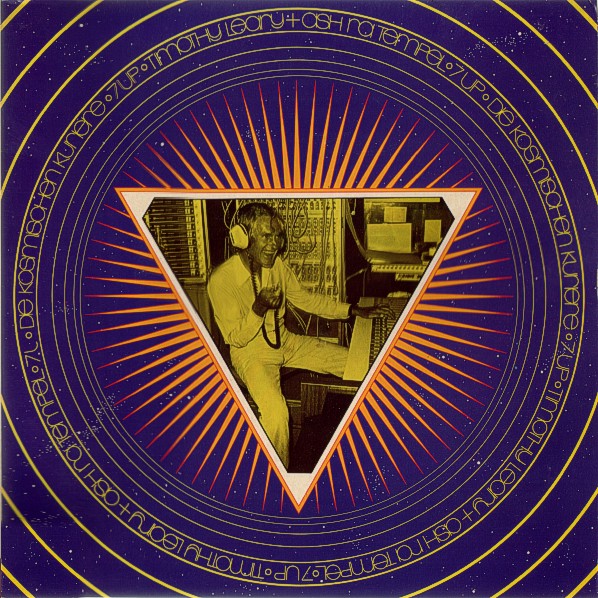 7. Cover of Ash Ra Tempel album SEVEN UP with Tim in the recording studio, Aug. 1972. Photo: Ash Ra Tempel
7. Cover of Ash Ra Tempel album SEVEN UP with Tim in the recording studio, Aug. 1972. Photo: Ash Ra Tempel
Tim and Brian Barritt participated in recording sessions with the krautrock band Ash Ra Tempel. Tim sang the lyrics they wrote for the album, released as Seven Up.
Sometime later he moved to Carona, near the Italian border, to finish his book in what we heard was a chaotic household. Tim's presence in Switzerland was by then well-known and attracted jet setters and celebrities like Andy Warhol and Keith Richards, as well as old friends like Ram Dass, and hippies passing through on their way to India.
"We have developed a unique 'schizoid' fast-moving lifestyle. And I'm never what people expect. The scene changes from week-to-week-and with those who know only the image"well, you know." (Leary writing us from Carona, Nov. 1972).
LR: What happened next?
MH: This is where heroin entered the scene through Barritt. By his own account, Tim dabbled briefly to explore the effects. He saw it as a euphoric turn-off that closed off the broad spectrum of human realities-the opposite effect from psychedelic drugs.
LR: What about the book?
MH: Leary finally finished his book and turned it in to the publisher. He felt he'd protected everyone involved in his escape. After all the literary experiments, the finished manuscript was a straightforward account called Confessions of a Hope Fiend, drawing on books by De Quincey and Crowley.
LR: Why did he leave Switzerland?
MH: The Swiss wanted him to find another country. I think they may have hoped he would disappear into the professional psychology sector, but he had no interest in going back to the academic world. But there was something else. Back in Orange County the courts were building a case against the Brotherhood of Eternal Love, whom the media called the "Hippie Mafia," labelling Tim as the "Godfather" of the operation-as if he had time to be a drug kingpin while surviving prison and then on the run as a fugitive. Leary was a scientist, a theoretician, and a popularizer, not a chemist or dealer.
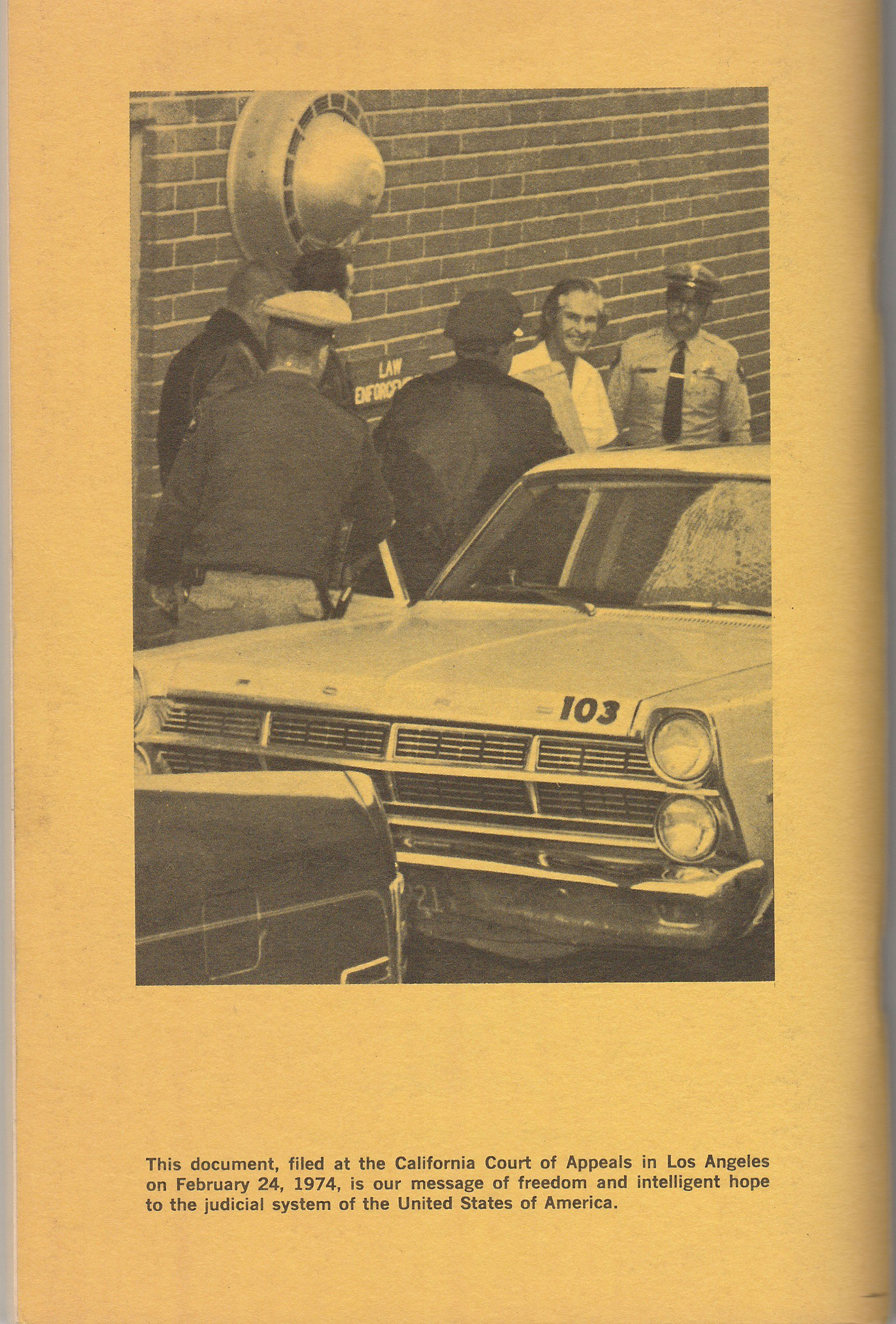 8. Press coverage of federal drug raids of the Brotherhood of Eternal Love, falsely linking Leary to their global drug activity. NY Times, Aug. 5, 1972. Photo: BEL website HYPERLINK "http://belhistory.weebly.com/"http://belhistory.weebly.com
8. Press coverage of federal drug raids of the Brotherhood of Eternal Love, falsely linking Leary to their global drug activity. NY Times, Aug. 5, 1972. Photo: BEL website HYPERLINK "http://belhistory.weebly.com/"http://belhistory.weebly.com
LR: Sounds like the American government was going all out to apprehend him.
MH: He'd made the Feds look bad too many times, and he'd aligned himself with their worst enemies-the Black Panthers, the Weather Underground, the Brotherhood of Eternal Love. Because of the new sweeping U.S. indictments the Swiss decided not to extend asylum and asked him to leave the country.
LR: Is that when Joanna Harcourt-Smith entered the picture?
MH: Yes. She was a Swiss-British jet-setter in her twenties. An ex-girlfriend of Hauchard who found her way to Tim. They fell hard for each other, spent every minute together. Tim knew it was his last weeks in Switzerland but not where he would go next. He was almost out of options. What better way to spend it than on a hedonic holiday.
LR: There was no country that would take him in?
MH: They needed a country that didn't have an extradition treaty with the U.S., and thought they'd find that in Afghanistan, where Tim had been told the king's nephew was a stoner who admired him.
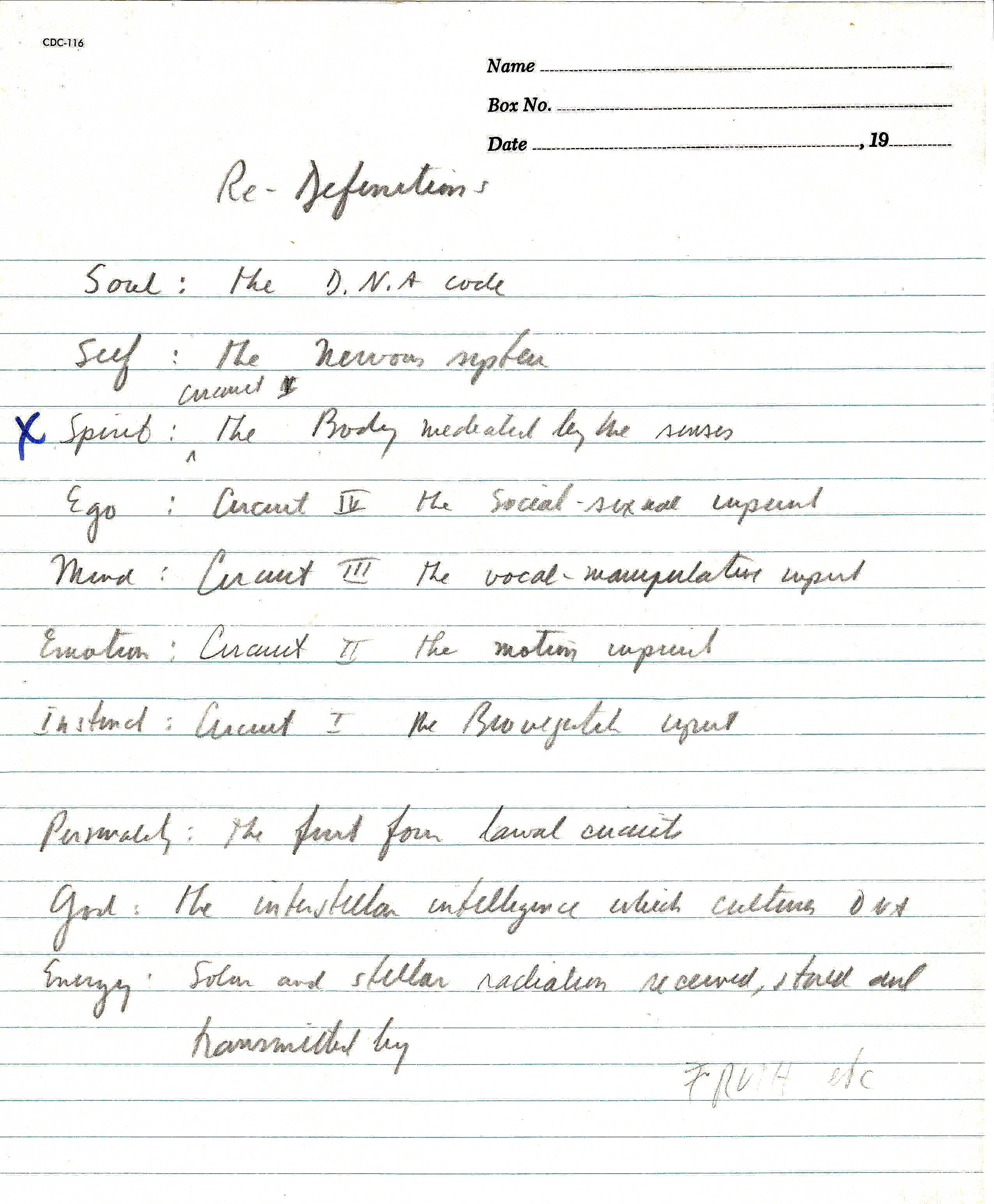 9. Timothy Leary & Joanna Harcourt-Smith in Vienna en route to Kabul, Dec. 1972. Photo: Christian Englaender for Rolling Stone
9. Timothy Leary & Joanna Harcourt-Smith in Vienna en route to Kabul, Dec. 1972. Photo: Christian Englaender for Rolling Stone
LR: Was he set up?
MH: They walked into a trap. Dennis Martino, who led them there, had been with the BEL, was wanted for violating parole, and soon to be a drug informant if not already one. The Brotherhood of Eternal Love had their hashish connections there, so the place was swarming with agents. The DEA-then called the Bureau of Narcotics and Dangerous Drugs--had been tipped off, and three armed agents were waiting for him in the Kabul airport. They grabbed his passport and couple of days later flew them both back to California.
LR: Wait. Despite Afghanistan not having to extradition treaty with the United States, Leary was handed over to the U.S. authorities?
MH: Leary was technically kidnapped, a point his lawyers pursued in court, but that wasn't going to deter Nixon's drug police nor the courts.
LR: Not when they had successfully invented a "Godfather of the Hippie Mafia."
MH: Exactly. Leary's escape had been a huge embarrassment and a terrible PR headache for the whole law enforcement establishment, who were still chasing the Weather Underground.
LR: How come Joanna was flown back with him? There were no charges against her, were there?
MH: None. It led to questions about her role that never went away. But she wasn't complicit in setting him up, as many thought. The government just thought she'd be a useful asset for them, seeing how tight she and Tim were. And they eventually went all out in using her that way.
LR: It must have been heavy news to you that Tim had been captured.
MH: It jolted us as much as the news of his prison escape over two years before. The idea of him going back to prison was brutal. They put a $5 million bail on him-the largest on a private citizen in American history.
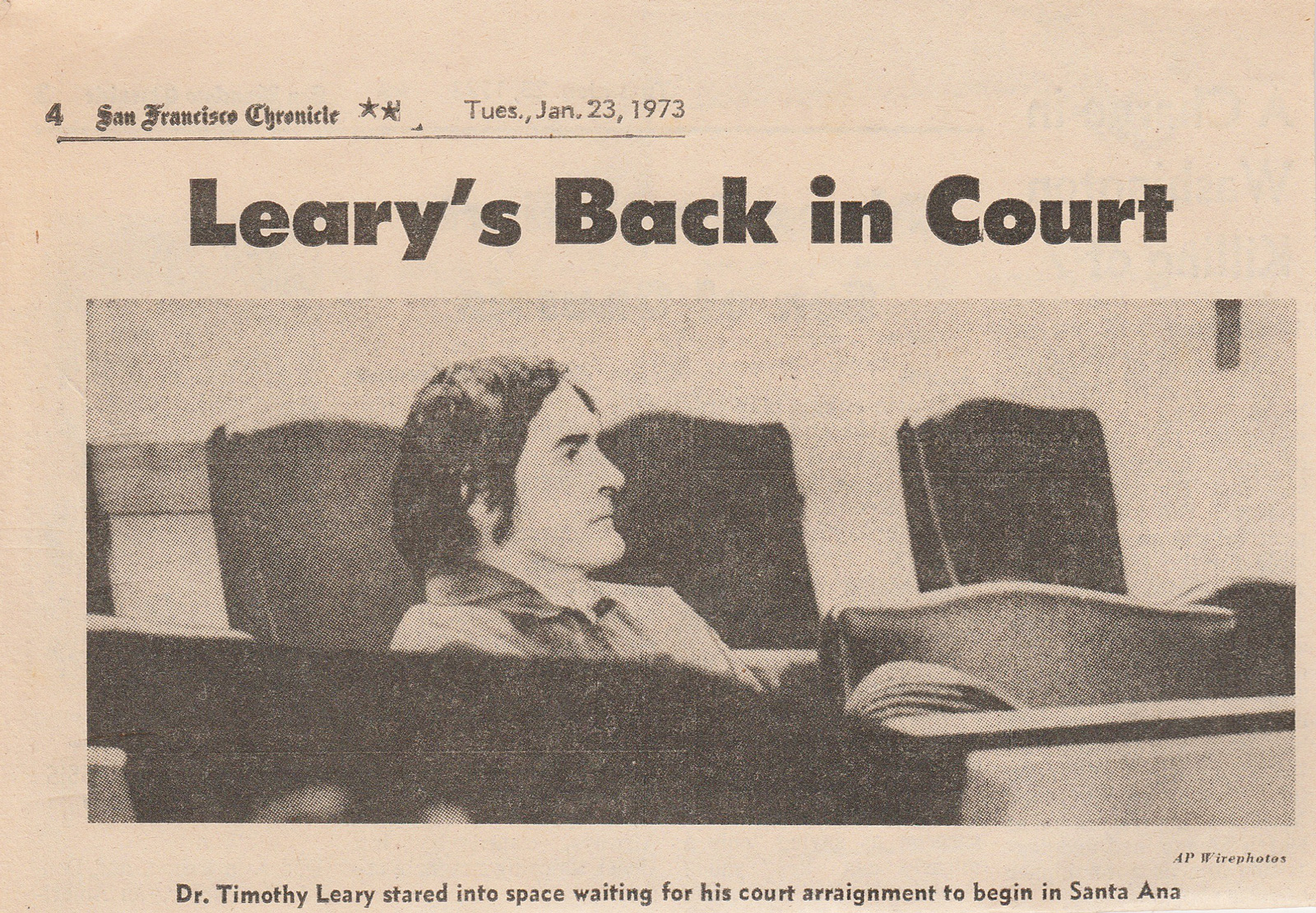 10. Leary in custody of LAPD. Los Angeles International Airport. Jan. 19, 1973 . Photo: Marvin Harms for Berkeley Barb
10. Leary in custody of LAPD. Los Angeles International Airport. Jan. 19, 1973 . Photo: Marvin Harms for Berkeley Barb
LR: For two roaches!
MH: Well, those were the original charges, but now he had his prison escape charges to contend with: five more years tacked on to the 10-year sentence for those two roaches.
He was also hit with indictments for Brotherhood of Eternal Love trafficking crimes-29 of them in all. Federal prosecutors threatened to tack on 75 years to the twenty or so he already faced in California, Texas and New York.
LR: Did Joanna get in touch with you?
MH: Right away. Tim had given her our names and numbers as they were landing at LAX. Things had long since soured with his lawyers and he hadn't yet gotten a new one. Bob headed down to LA and, with no legal experience whatsoever, represented Tim at his arraignment.
LR: What was Joanna like?
MH: Neither the counterculture nor the prosecutors and prison system knew what to make of her. Her outspoken, upper-class European manner put people off. She had an edge, and knew how to get her way. Tim empowered her, and she in turn was tremendously loyal to him, dedicated to getting him out-whatever it took. Alienating many in the counterculture was the fallout from that.
Once again, Tim had a woman deeply in love with him working tirelessly for his freedom and keeping alive the image of a brilliant man imprisoned for his ideas.
LR: What was his state of mind?
MH: This was the most amazing thing about him. After the final chaotic month in Switzerland, the wild social scenes, the heroin experiments with Barritt, the LSD binge with Joanna, the pressure of having to find a country that would welcome him, the bust at the airport and return to face the rest of his life in prison-after all that, and awaiting a trial that would not end well, he still wrote one of his most important works in a maximum security prison cell with a pencil stub under a 20-watt lightbulb.
LR: That was Neurologic?
MH: Yes. His most far out theory to date on the evolution and operation of the human nervous system, outlined in seven brain circuits. He wrote a more advanced version four years later called Exo-Psychology, expanding it to eight circuits: four terrestrial and four extra-terrestrial. He wove in comparative data and metaphors from ancient occult systems like the I Ching and Tarot.
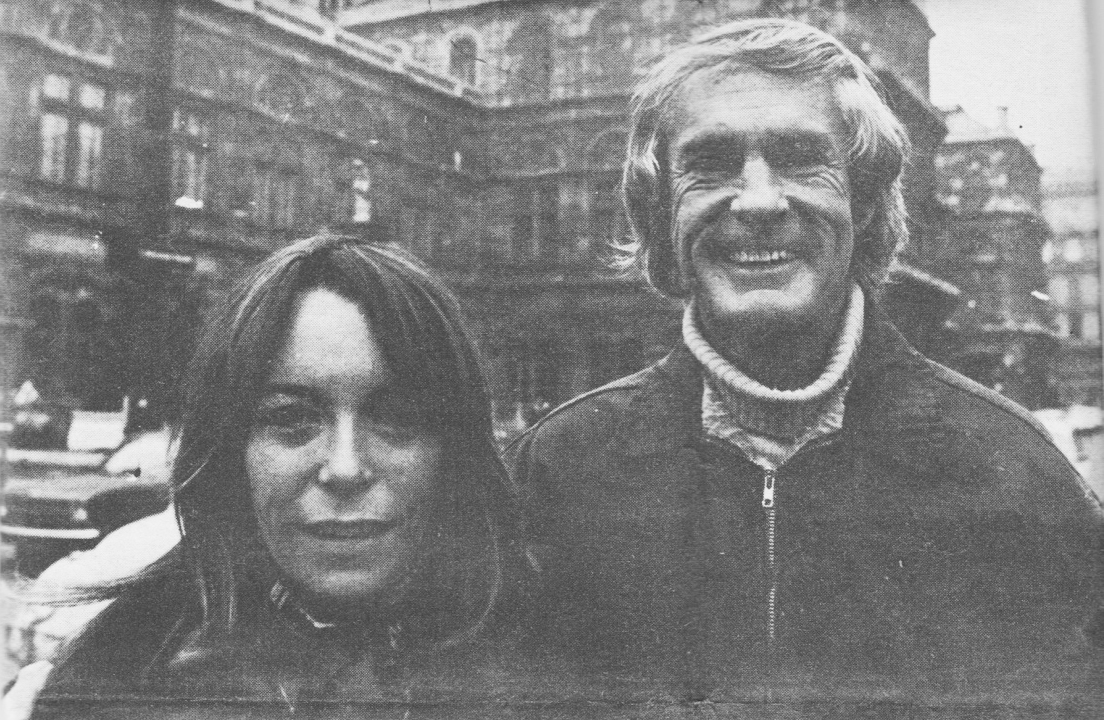 11. First draft notes of Neurologic, written by Leary in solitary confinement while awaiting trial for escape. Jan. 1973. Leary Archives, New York Public Library
11. First draft notes of Neurologic, written by Leary in solitary confinement while awaiting trial for escape. Jan. 1973. Leary Archives, New York Public Library
"It was one of the those inspired clear-channel transmissions. I had been thinking about the classification of brain circuits for years, and now in a slow tidy handwriting, with almost no corrections, the words poured out." (Leary, Flashbacks)
LR: Where was the trial held?
MH: In the city where he had escaped prison--San Luis Obispo, California. For the most part Leary directed his own defense strategy. Since he'd stood accused of frying his brain with LSD, he thought he may as well play that card.
LR: How would that get the jury on his side exactly?
MH: I doubt that he thought it mattered. He didn't see any useful options to rationalize his escape, so he thought he may as well throw it all out there. The essence of his defense was that hundreds of ingestions of LSD had permanently altered his brain, which made it intolerable to be caged in a prison.
LR:But didn't this go against the prevailing hypothesis that LSD doesn't have any harmful long term effects, when taken responsibly? Wasn't he basically taking the opposite position that he had taken for years about these drugs having a positive effect on the mind?
MH: There's no arguing that he intentionally adopted the rhetoric of the government and the mainstream media in his defense. It could not be more ironic!
LR: Were you involved in his defense?
MH: Early on, Joanna relayed that Tim wanted me to prepare a historical outline of medical scientists who had been ridiculed while risking their reputations and even their lives conducting research with dangerous materials-bacteria, viruses, chemicals, radioactivity--resulting in great benefits for mankind.
LR:Weren't you guys worried that it would seem a bit egotistical comparing his work on LSD to discoveries like eradicating smallpox?
MH: Tim was arguing that, in order to understand the nature of an experimental mind drug, he had risked his sanity by testing it hundreds of times over twelve years while keeping precise records in a variety of experimental conditions.
LR:Wow, really? Even though, he must have known that taking LSD responsibly, even hundreds of times, would not actually be harmful to one's sanity? Isn't that like providing a bad example of what happens when you do too much acid? How sad. No wonder LSD got a bad reputation, if this was coming straight from him.
MH: Well, this is 1973. And he was playing to jury of people who believed that anyway. Again, this was courtroom testimony of someone facing life in prison and having no other defense.
LR: Did you testify?
MH: No, and I think it was a mistake. Not that it would have changed the outcome, but it would have given his actions a historical context of high risk research toward a greater end. I had prepared a statement outlining the historical evidence, but Tim's legal strategy, what there was of it, had changed. The emphasis was instead on his psychological distress as a prisoner. He touched on this when he took the witness stand to testify in his own defense, by quoting from his unpublished manuscript, Neurologic:
"For the person who makes LSD his profession, it becomes a permanent alteration of the way one sees the world and one's self in it. It's called the 6th circuit of consciousness where your mind travels through your body". I believe I've been permanently changed as a result of LSD and yoga disciplines.I have gone beyond the 20th century and am essentially a time traveler."
LR:How did that go over with the jury?
MH: Evidently not well. They convicted him after deliberating less than two hours.
LR: Well, I'm not surprised.
MH: No one expected a different outcome. He also said he would try to escape again. That guaranteed he would be assigned to a maximum security prison.
LR: Are you sure that, at this point in time, Tim wasn't actually out of touch with reality, and not just faking it for the jury?
MH: No, and no one involved with him thought that either, though he did stretch the boundary at times. Since the fact of his escape was a non-issue, he tried a creative if doomed defense.
LR: What role did Bob Barker play in all this? Was he on the legal team?
MH: Prior to the trial, Bob and Joanna had a major falling out due to personal clashes, and he decided he couldn't continue dealing with her and at the same time with Tim's ever-changing situational needs. He pulled out. This left me to carry on alone. I did my best to keep Bob aboard, but his mind was set.
LR: Oh that's too bad. It's always sad to lose an awesome collaborator - and friend. That must have been difficult.
MH: I didn't want to lose Bob after all we'd been through together. The Gemini-Sagittarius axis was strong. Plus, I was looking at a ton more work that I would now have to do on my own. Fortunately, Bob continued to be a driving force in building the Ludlow Library, even though he stepped down from working directly with Tim's archives.
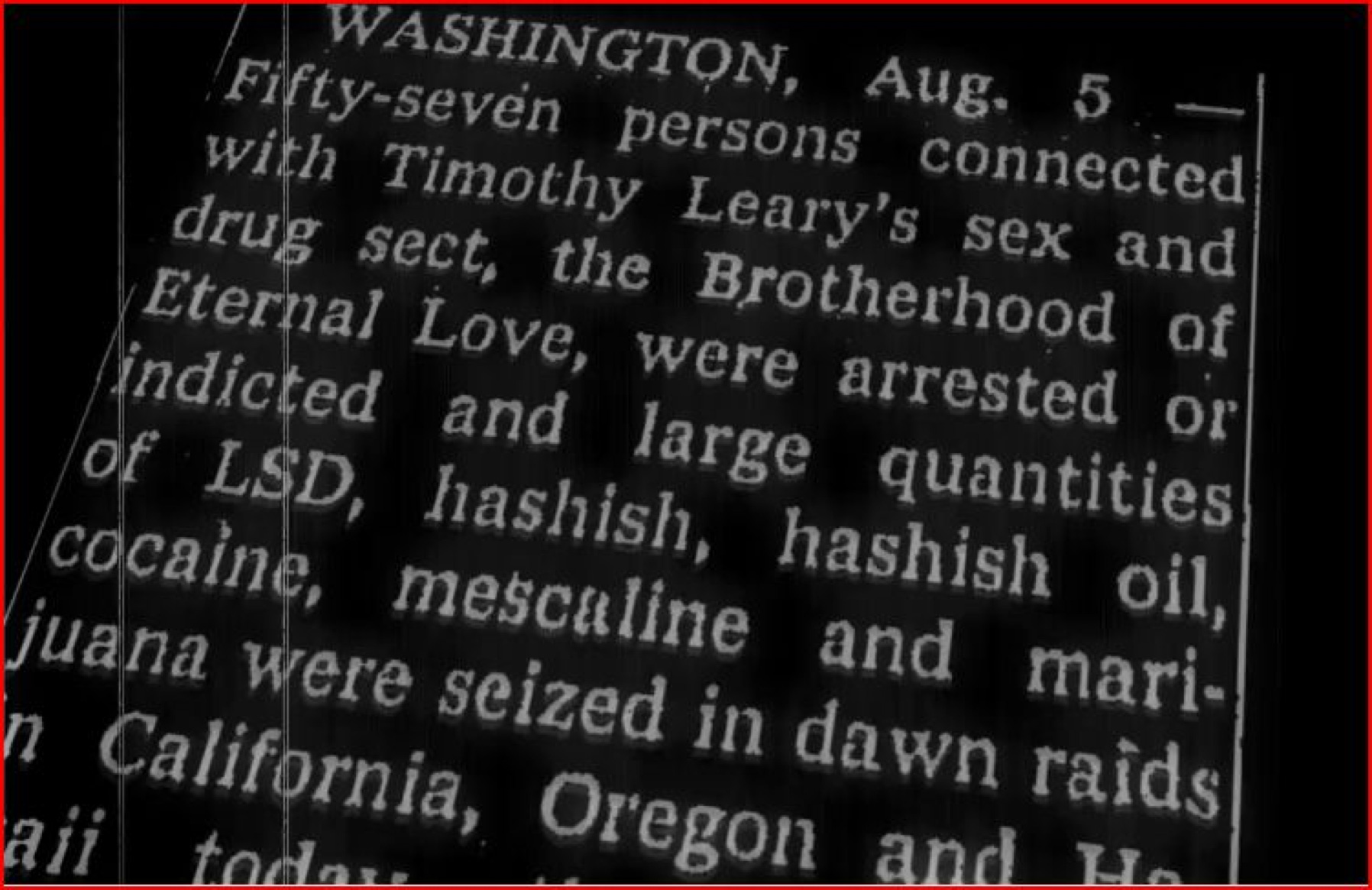 12. Leary in courtroom awaiting start of trial for his 1970 escape. San Luis Obispo County Courthouse, Jan .23, 1973. AP Wirephotos, San Francisco Chronicle .
12. Leary in courtroom awaiting start of trial for his 1970 escape. San Luis Obispo County Courthouse, Jan .23, 1973. AP Wirephotos, San Francisco Chronicle .
LR: What happened next?
MH: The Brotherhood drug conspiracy charges were dropped for lack of evidence. Turns out that it was only a ploy by the Feds to place Leary in the worst possible light when he made his pitch for continued asylum to Switzerland, or any other country that might have otherwise been open to granting it to him. He received five years for escape, added to his original 10-year sentence. And that was just his California time.
LR: Nixon must have been gloating. He had his drug war trophy. But isn't this when the Watergate scandal hit?
MH: Yep. The Watergate cover-up was in full swing that spring and summer. G. Gordon Liddy, Tim's old nemesis from Millbrook days, was eventually convicted for masterminding the break-in and sentenced to prison the very month Leary was captured in Afghanistan.
LR: Amazing. After working to frame Tim in the '60s, he helped bring down Nixon.
MH: From prison Leary published a piece about it, "The Curse of the Oval Room." Even more amazing was that they later met in prison, became friends and teamed up on the lecture circuit debating political issues after they got out.
LR: Amazing. Where did Tim get sent next?
MH: Folsom Prison. He endured a lot there, but remained hopeful and upbeat. He found another way of escaping-by setting his sight on the stars. Literally.
LR: Literally?
MH: He felt he was living in a science fiction world. He became interested in space colonies and space travel. In communication with extra-terrestrial intelligence. In panspermia as the origin of life. Psychology evolving to Exo-Psychology. He believed the LSD experience gave a preview of what was on the horizon.
Tim was on the path to becoming a futurist, taking inner space to outer space in the material sense. It led him to write a series of provocative books, and to devise one of the most bizarre prison escape plots ever hatched.
The 4th part of my interview with Leary archivist Michael Horowitz will be published later in the year. -LR